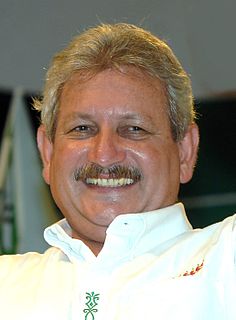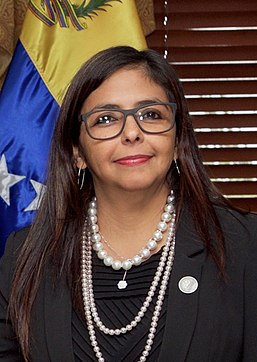A congress is a formal meeting of the representatives of different countries, constituent states, organizations, trade unions, political parties or other groups. The term, originally denoting a parley during battle in the Late Middle Ages, is derived from the Latin congressus.

A constitutional convention is a gathering for the purpose of writing a new constitution or revising an existing constitution. Members of a constitutional convention are often, though not necessarily or entirely, elected by popular vote. However, a wholly popularly-elected constitutional convention can also be referred to as a Constituent assembly.

The National Assembly is the de jure legislature for Venezuela that was first elected in 2000. The National Assembly has been rendered ceremonial since the introduction of the Constituent Assembly in 2017. It is a unicameral body made up of a variable number of members, who were elected by a "universal, direct, personal, and secret" vote partly by direct election in state-based voting districts, and partly on a state-based party-list proportional representation system. The number of seats is constant, each state and the Capital district elected three representatives plus the result of dividing the state population by 1.1% of the total population of the country. Three seats are reserved for representatives of Venezuela's indigenous peoples and elected separately by all citizens, not just those with indigenous backgrounds. For the 2010-2015 period the number of seats was 165. All deputies serve five-year terms. The National Assembly meets in the Federal Legislative Palace in Venezuela's capital, Caracas.

Elections in Bolivia gives information on elections and election results in Bolivia.

The Plurinational Legislative Assembly is the national legislature of Bolivia, placed in La Paz, the country's seat of government.

The Movement for Socialism–Political Instrument for the Sovereignty of the Peoples, alternately referred to as "Movement Toward Socialism" or "Movement to Socialism", is a Bolivian left-wing socialist political movement led by Evo Morales, founded in 1998. Its followers are known as masistas.
The Confederation of Indigenous Peoples of Bolivia,, is a national representative organization of the Bolivian indigenous movement. It was founded in October 1982 in Santa Cruz de la Sierra as the Confederation of Indigenous Peoples of the Bolivian East, with the participation of representatives of four indigenous peoples of the Bolivian East: Guarani-Izoceños, Chiquitanos, Ayoreos and Guarayos.

A constitutional referendum was held in Bolivia on 25 January 2009, postponed from the initially planned dates of 4 May 2008 and then 7 December 2008. Drafted by the Constituent Assembly in 2007, the new constitution was approved in the referendum according to an exit poll by Ipsos Apoyo for La Razón and ATB, a Bolivian television network. Furthermore, it required early elections to be held on 6 December 2009.
The Constituent Assembly, is a term describing one of the three methods by which amendments to the 1987 Constitution of the Philippines may be proposed. The other two modes are via People's Initiative and Constitutional Convention. All three require a majority vote in a national referendum.

Rubén Armando Costas Aguilera is a Bolivian politician and the current governor of Bolivia's Santa Cruz department for the Truth and Social Democracy (VERDES) party. In 2013, he founded the Social Democrat Movement party to participate in the 2014 presidential and parliamentary election. Previously he served as prefect on behalf of the Autonomy for Bolivia party. He was one of the nine Bolivian prefects directly elected in the general elections of 2005. This election was the result of several negotiations and large, peaceful public demonstrations in Santa Cruz. The 1967 Bolivian constitution said that prefects can only be appointed by the president, but because of the negotiations and popular desire, the Bolivian Congress approved Law 3015 to formalize the prefect election process.

The constitutional history of Colombia is the process of formation and evolution of the different constitutions that Colombia has had since its formation.

The following outline is provided as an overview of and topical guide to Bolivia:

Bolivia has had seventeen constitutions, including the present one, since its foundation in 1825.
The Political Constitution of the Republic of Bolivia, approved on February 2, 1967, and promulgated on February 3, 1967, was the 16th constitution in the country's history. The text was drafted by the Bolivian Constituent Assembly of 1966-67, which met from August 16, 1966 to February 3, 1967. The 102 assembly members included representatives of the Social Democratic Party led by Luis Adolfo Siles Salinas, the Popular Christian Movement and the Bolivian Socialist Falange. It operated under the shadow of the military dictatorship which took power in 1964.
The National Coordination for Change is a Bolivian political coordination of social movements aligned with the governing Movement for Socialism-Political Instrument for the Sovereignty of the Peoples (MAS-IPSP). It was founded on 22 January 2007, during the Constituent Assembly of 2006-2007. CONALCAM mobilizes its member organizations in support of the "process of change" which includes the drafting and implementing of a new Constitution as well as a variety of social reforms.

Constituent Assembly elections were held in Venezuela on 30 July 2017 to elect the members of the 2017 Constituent National Assembly Unlike the 1999 Constituent National Assembly, which was assembled following a referendum, the 2017 election was unconstitutionally convened by the presidential decree of President Nicolás Maduro.

The Constituent National Assembly is a constituent assembly elected in 2017 to draft a new constitution for Venezuela. The assembly also has constitutional supreme power above all other institutions in the republic. Its members were elected in a special 2017 election that was condemned by over forty mostly Latin American and Western states. The Democratic Unity Roundtable—the opposition to the incumbent ruling party—also boycotted the election claiming that the Constituent Assembly was "a trick to keep [the incumbent ruling party] in power." Since the opposition did not participate in the election, the incumbent Great Patriotic Pole, dominated by the United Socialist Party of Venezuela, won almost all seats in the assembly by default.










